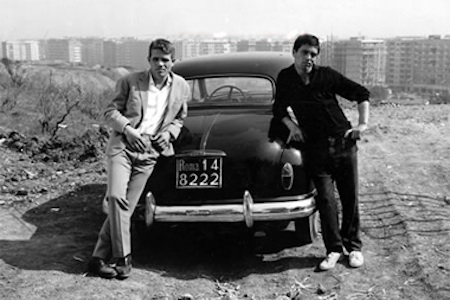
Pier Paolo Pasolini was perhaps film’s most challenging director, a man whose confrontational films were part morality play and part Marxist tract. In honor of what would have been his ninety-first birthday, we offer these few thoughts by and about Pasolini.
1. “I’ve never wanted to make a conclusive statement,” he says in Pier Paolo Pasolini: A Filmmaker’s Life (1971), “I’ve always posed various problems and left them open to consideration.”
2. Franco Citti, in the same film, on meeting Pasolini: “[When] I met Pasolini…we were just kids. We were bathing in a dirty river. He came to talk, write down notes. In an instant we were friends.”
3. He lived in the same building as Bernardo Bertolucci during the filming of Accattone and the two would carpool to work. Bertolucci initially thought Pasolini was a gangster until his father formally introduced him to his future mentor. Bertolucci would later say that films like Accattone did not have cinematic precedent as much as they drew from classical art and literature (seven of his twelve features were literary adaptations).
4. Pasolini’s father Carlo served in the Fascist army, and the two were estranged. As Nico Naldini, his cousin, says in an essay in Pier Paolo Pasolini: Contemporary Perspectives, “…Pasolini’s father testified…that he himself, with his own arm, had deflected the bullet, aimed at the Duce. Now it is known that this attempt on the life of Mussolini was nothing but a stunt carried out by a regime in need of pretexts for repression and of occasions to divinify Mussolini, to strengthen his cult, and make him appear to be protected by the heavens.” Further chilling his relationship with his father was the murder of his brother Guido, a resistance fighter.
5. Pasolini often courted controversy and was brought up on several charges of blasphemy and obscenity throughout his career. His homosexuality was made public early in his life, when he lost a teaching job over an affair with one of his students.
6. He was a fan of A.S. Roma and could be seen weaving through the streets of Rome in his grey Alfa Romeo 2000 GTV. This, incidentally, was the car that was used to kill him.
7. Pasolini was fond of casting non-actors, including Franco Citti (later of The Godfather) in Accattone and, in The Gospel According to Saint Matthew, Enrique Irazoqui, who today runs computer chess tournaments.
8. Pasolini’s segment in Ro.Go.Pa.G., La Ricotta, features a Catholic Marxist auteur played by Orson Welles giving a combative interview to a gormless reporter. As if the reference were too vague, Welles’ director begins to recite poetry from a handy copy of Mamma Roma:
“I am a force from the past. Tradition is my only love. I come from the ruins, churches, altarpieces, forgotten hamlets in the Apennines and the foothills of the Alps where dwell our brothers…”



